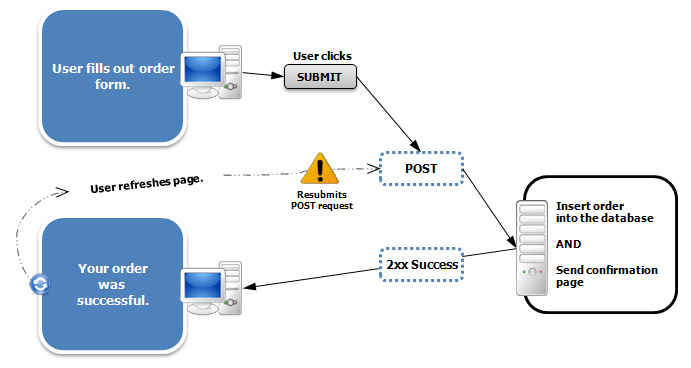前面的Post有提到解决Web中表单重复提交的方法,实际上表单重复提交的问题不单是Asp.net,其它动态Page都有。让我们看下面的图示:
然后在刷新页面时经常看到提示框在IE中:
Google Chrome:
Firefox:
最简单的解决方法就是使用Post-Redirect-Get模式,就是Http-Post完后,马上做Redirect操作,接下来那个页面是Get。这时用户强制按F5刷新也没有用了。最终实现的效果图:
那在Asp.net MVC中如何去做呢,看下面简单View代码:
一个包含两个Input的表单:
<form method="post" id="form1" action="/Security/LoginVerify"> <p> UserName:<input type="text" id="fusername" name="fusername" /><br /> Password:<input type="password" id="fpassword" name="fpassword" /> <input type="submit" value="Sign-in" /> </p> </form>
Index Action 在这里做Get的操作, LoginVerify 在这里是Post的目标Action
[HttpPost] public ActionResult LoginVerify(string fusername, string fpassword) { return this.RedirectToAction("Index", "Security", new { fusername = fusername }); }
public ActionResult Index(string fusername) { ViewBag.UserName = fusername + " login success!"; return View(); }
对应请求时的HTTP Request RAW是这样的:
POST http://localhost:91/Security/LoginVerify HTTP/1.1
Accept: text/html, application/xhtml+xml, */*
Referer: http://localhost:91/Security/Login
Accept-Language: en-US,zh-CN;q=0.5
User-Agent: Mozilla/5.0 (compatible; MSIE 9.0; Windows NT 6.1; WOW64; Trident/5.0)
Content-Type: application/x-www-form-urlencoded
Accept-Encoding: gzip, deflate
Host: localhost:91
Content-Length: 71
Connection: Keep-Alive
Pragma: no-cache
Cookie: ASP.NET_SessionId=qwwlp4rmjnzbsq3ob4dmcg3q
Http Response RAW:
HTTP/1.1 302 Found
Cache-Control: private
Content-Type: text/html; charset=utf-8
Location: /Security?fusername=admin
Server: Microsoft-IIS/7.5
X-AspNetMvc-Version: 3.0
X-AspNet-Version: 4.0.30319
X-Powered-By: ASP.NET
Date: Sat, 24 Mar 2012 02:54:26 GMT
Content-Length: 142<html><head><title>Object moved</title></head><body>
<h2>Object moved to <a href="/Security?fusername=admin">here</a>.</h2>
</body></html>
在现在大多数的Web应用程序中都使用是Http 302的重定向。Http 1.1说明书中引用HTTP 303就是用来应对这种用户提交表单后可以在浏览器安全的刷新场景。 HTTP 303 意义是这样的:
Used to tell the client that the resource should be fetched using a different URL. This
new URL is in the Location header of the response message. Its main purpose is to
allow responses to POST requests to direct a client to a resource.
在Asp.net MVC可以这些去实现一个自定义ActionResult:
/// <summary> /// SeeOtherRedirectResult /// </summary> public class SeeOtherRedirectResult : ActionResult { private string _url; /// <summary> /// Initializes a new instance of the <see cref="SeeOtherRedirectResult"/> class. /// </summary> /// <param name="url">Target URL.</param> public SeeOtherRedirectResult(string url) { _url = url; } /// <summary> /// Enables processing of the result of an action method by a custom type that inherits from the <see cref="T:System.Web.Mvc.ActionResult"/> class. /// </summary> /// <param name="context">The context in which the result is executed. The context information includes the controller, HTTP content, request context, and route data.</param> public override void ExecuteResult(ControllerContext context) { context.HttpContext.Response.StatusCode = 303; context.HttpContext.Response.RedirectLocation = _url; } }
然后Action中使用它,来实现Http 303的重定向。:
[HttpPost] public ActionResult LoginVerify(string fusername, string fpassword) { return new SeeOtherRedirectResult(Url.Action("Index", "Security", new { fusername = fusername })); }
运行时,我们来看Http Response RAW:
HTTP/1.1 303 See Other
Cache-Control: private
Location: /Security?fusername=admin
Server: Microsoft-IIS/7.5
X-AspNetMvc-Version: 3.0
X-AspNet-Version: 4.0.30319
X-Powered-By: ASP.NET
Date: Sat, 24 Mar 2012 03:05:37 GMT
Content-Length: 0
完了,希望对您Web开发有帮助。如有任何问题请留言!
您可能感兴趣的文章:
Asp.net MVC中防止HttpPost重复提交
JQuery防止退格键网页后退
作者:Petter Liu
出处:http://www.cnblogs.com/wintersun/
本文版权归作者和博客园共有,欢迎转载,但未经作者同意必须保留此段声明,且在文章页面明显位置给出原文连接,否则保留追究法律责任的权利。
该文章也同时发布在我的独立博客中-Petter Liu Blog。








【推荐】国内首个AI IDE,深度理解中文开发场景,立即下载体验Trae
【推荐】编程新体验,更懂你的AI,立即体验豆包MarsCode编程助手
【推荐】抖音旗下AI助手豆包,你的智能百科全书,全免费不限次数
【推荐】轻量又高性能的 SSH 工具 IShell:AI 加持,快人一步